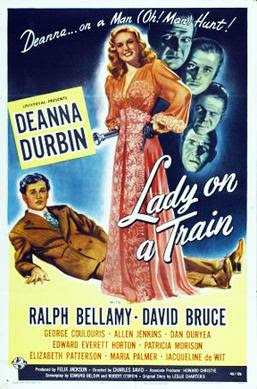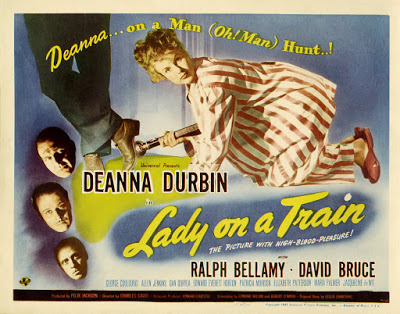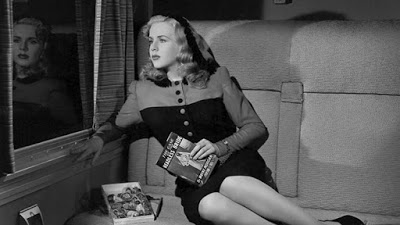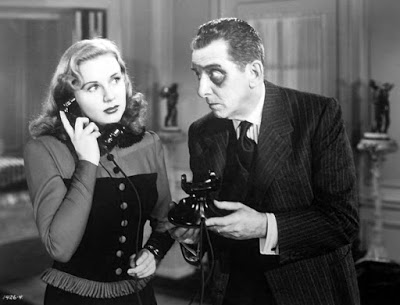Lady on a Train

Director: Charles David
Year: 1945
Rating: 7.5
In Lady on a Train Deanna Durbin is all grown up. That is established from
the opening shot of her curled up on a train seat, reading a mystery novel,
eating chocolates, with her dress pulled up to her knees and now very blonde.
In the film she gets to wear glamourous clothes, sing a couple torch numbers
and have the camera and lighting close in on her face like it is a religious
icon. Yet Universal wasn't about to go too far from the things that had made
Deanna a star for nearly nine years and her films box office hits. She is
still as cheery as Christmas morning and as innocent as a rosebud. It is
a good screwball murder mystery that is a great vehicle for Deanna allowing
her to sing a few songs, show great comic timing and look like she is having
a great time. She is surrounded by a terrific cast - Edward Everett Horton,
Ralph Bellamy, Dan Duryea, William Frawley and Allen Jenkins. The film tries
to find the correct balance between a comedy and a tense who dun it and perhaps
leans into the comedy too much, but it is a fun ride.
When the train comes to a temporary stop, Nikki (Deanna) looks out the window
and sees a man being murdered in a building across from her (did Agatha Christie
get her similar idea from this?). She sees him clearly but the killer has
his back to her. She goes to the cops and of course they don't believe her
and so like the little train that could she sets out to investigate it on
her own. Nancy Drew style. But with rocks in her head. She never really figures
out anything but stumbles into everything. Including a house full of suspects
of the wealthy dead man and is mistaken for a nightclub entertainer and has
to sing two songs - one being the lovely Night and Day. Nice hearing her
sing a pop standard for a change. She also sings Silent Night (it being Christmas
Eve) to her father - wealthy of course - over the phone which is unintentionally
kind of creepy because she sings like he is a faraway lover. A thug waiting
outside her bedroom for her begins to weep and decides to leave her alone!
The murders pile up. She hooks up with the writer (David Bruce) of the mystery
she was reading and he turns out to be no smarter than she is. They both
live under a lucky star. He is also rich and has the thin snooty girlfriend
that is expendable. The finale in which the killer is revealed is well-done
and yet the lead up makes no sense at the same time. Certain plot points
just don't connect. But audiences were there for Durbin, not a finely plotted
film. And they get plenty of that. Durbin was to make five more films and
then suddenly retire. She was 27 years old. She left Hollywood and never
returned. She had had enough of the life and wanted her privacy. She married
the director, Charles David) of this film - her third and final marriage
- and they apparently went off to France and were hardly ever seen or heard
from again.
I just want to mention that a lot of the fact gathering for my short look
at Durbin's films was from the very good book by Jeanine Basinger titled
The Star Machine in which she writes an essay on Durbin.




